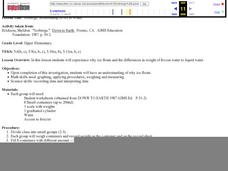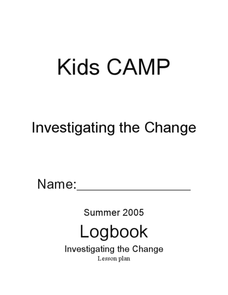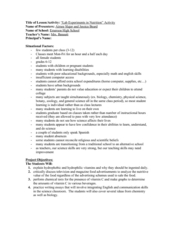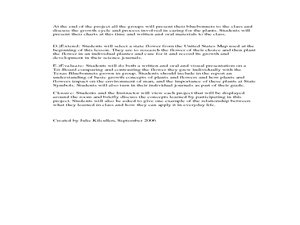Curated OER
Grade 8: Intermediate-Level Test, Science Written Test, 2006
In this 8th grade science standardized test practice worksheet, 8th graders respond to 73 multiple choice and short answer questions that require them to review their knowledge of science.
Curated OER
Grade 8: Intermediate-Level Test, Science Written Test
In this 8th grade science standardized test practice worksheet, 8th graders respond to 80 multiple choice and open-ended questions regarding science topics. The questions correlate to the New York academic standards.
Curated OER
Grade 8: Intermediate-Level Test, Science Written Test, 2004
In this 8th grade science standardized test practice worksheet, 8th graders respond to 78 multiple choice and short answer questions that require them to review their knowledge of science.
Curated OER
Curious Science: Fireflies
In this online interactive science quiz worksheet, students respond to 4 multiple choice questions about fireflies and their attributes.
Curated OER
Personal Ecosystem
Young scholars build an aquatic ecosystem using large glass pickle jars. In this ecology lesson, students build and ecosystem then observe and collect data on the habitats. In this long term project young scholars observe a population...
Curated OER
Lesson Plan
Learners play several activities that allow them to know the terminology used. In this project management lesson plan students create a storyboard.
Curated OER
Summer Water & Sand Activity: Go with the Flow
Young scholars discover different materials that help to transport water in order to develop their observation and problem solving science skills. In this water lesson, students first brainstorm about different ways that water can be...
Curated OER
Icebergs: Relationship of Ice to Water
Students experience why ice floats and the differences in weight of frozen water to liquid water. Students explore why ice floats. They use math skills such as: graphing, applying procedures, weighing and measuring. Students also use...
Curated OER
Physical Science: The Three Billy Goats Gruff
Explore science through problem solving and learning how to solve the problem of the story "The Three Billy Goats Gruff." Young investigators will learn how to construct a model and design a solution. They will also keep records of their...
Curated OER
Earth Moon Scaling
A wonderful lesson incorporating math and physics skills along with specific details about the planetary bodies. The cross-curricular approach makes for a valid activity to challenge multiple ages and abilities. Your class could work in...
SurfScore
Kodable
Prepare young scholars for life in the twenty-first century with this introduction to computer coding formatted as a fun problem solving game, this resource is a great way to develop children's sequential thinking skills.
Curated OER
Discovering Local Food Chains
Fourth graders study about food chains. With the assistance of a local biologist, Students hike the school trail system. They explore ecosystem and collect data by charting the organisms found and identifying the energy source. They...
Mississippi State University
The Five Senses
Your learners engage their five senses every day without knowing it. Help them identify their experiences and extend their understanding with a month full of lessons designed for the five senses. Kids focus on a different sense every...
Curated OER
Investigating the Change
Sugar crystal growth is observed as an example of physical change and cabbage juice pH indicator is used to demonstrate chemical change. The crystal growth is tracked over five days. The cabbage juice experiment is involved and can also...
Curated OER
A Model of the Sea-floor
Students create a paper model to illustrate sea-floor spreading.
Curated OER
The Chesapeake Bay in Captain John Smith's Time
When Captain John Smith visited the Chesapeake Bay in the summer of 1608, what types of animals and habitats did he encounter? Your young historians will analyze primary source documents to answer this question, as well as compare the...
Curated OER
Investigating The Mysteries Of Third Grade
Third graders use logic and knowledge of mathematics facts to solve problems. They see that pigments can be broken down into separate colors. Pupils recognize the capacity of water to move upward and measure the height water travels up...
Curated OER
Lab Experiments in Nutrition Activity
Which vitamins should be ingested daily for maximum nutrition? Learners with ispecial needs or those who are pregnant focused on television and magazines advertisements that are used to sell food products. They conduct experiments and...
Curated OER
Creating Children's Books
Students collaborate to create a children's book. In this visual arts instructional activity, student study the components and procedures that go into making a children's book including the shape, size. layout, biographical information...
Illinois Department of Natural Resources
Section One: What is Biodiversity?
Four intriguing and scientific activities invite learners to explore the natural resources of their town. The activities cover concepts such as genetic traits, organizing species in a taxonomy, the differences between different species...
Curated OER
How Does Your Blue Bonnet Grow?
Learners explore the conditions needed to grow Texas Blue Bonnets. In this Blue Bonnet planting lesson, students recognize the differences in Texas Blue Bonnet. Learners record their findings in a graphs and analyze their results.
Code.org
Good and Bad Data Visualizations
Good versus bad data. Pairs rate online collections of data representations from good to bad and then suggest ways to improve the visualizations. The class then creates a list of best practices and common errors in data representations...
Curated OER
Measuring Speed With iMovie
Students record each other running, walking, throwing a ball, or doing a similar activity for a set distance. They import the video clips into iMovie. They compute how long it took in miles per hour.
Baylor College
We Need Water
There's nothing quite like a glass of ice-cold, freshly squeezed lemonade. Lesson seven of this series explains how the water humans need to survive can come in many forms. Teach your class about how much water humans require every day...
Other popular searches
- Science Literacy Activities
- Note Taking Skills, Science
- 5 Science Process Skills
- Observation Skills Science
- Graphing Skills in Science
- Study of Science
- Note Taking Skills Science
- Real Life Skills Science
- Basic Science Process Skills
- Science Skills Activity
- Field Study Science
- Basic Science Skills

























